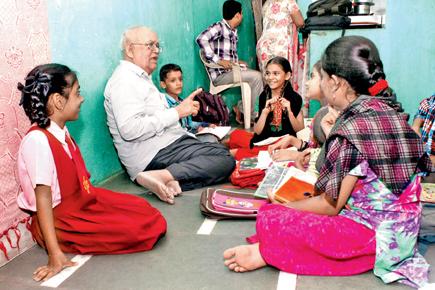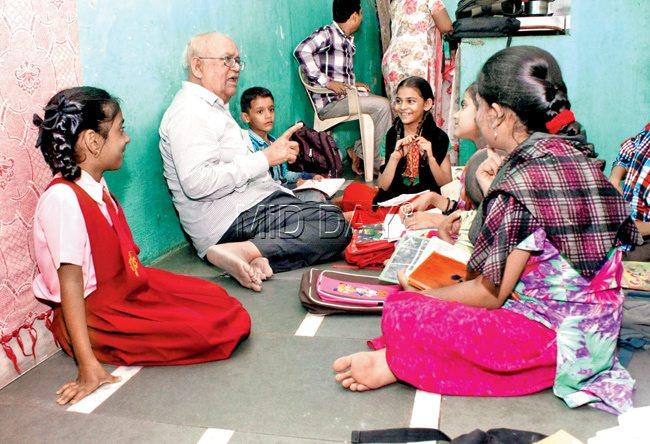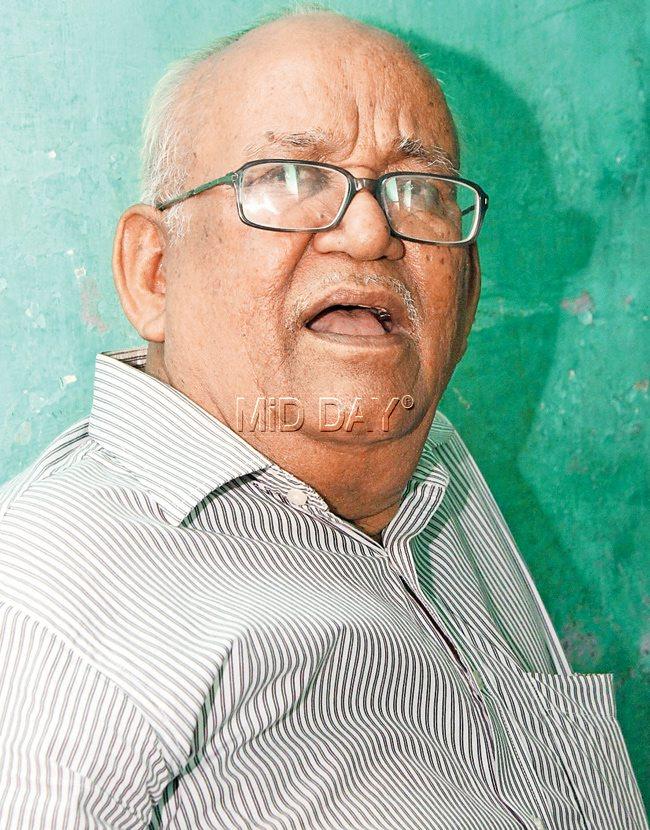Feroze Ashraf left a steady paying job nearly 20 years ago to hold free classes for slum children in Jogeshwari, many of whom have gone on to become teachers, bankers and lawyers

Feroze Ashraf
At 73, he’s undergone quite a few surgeries that have left him a little frail, but for kids from various slums in Jogeshwari, Feroze Ashraf is still Super Uncle. Ashraf has spent the last two decades of his life filling the gaps in the teaching that takes place in municipal schools by conducting classes for students from various parts of Jogeshwari — especially those who couldn’t afford to pay for such classes.
ADVERTISEMENT

One man, many hats: Feroze Ashraf with some of his students in Jogeshwari. He was also one of scriptwriters for the popular TV show Surabhi. Pic/Nikesh Gaurav
Today, many of Ashraf’s students have gone places thanks to his support — some have gone on to become teachers, some are employed in banks and a couple of them have just earned their law degrees — and Ashraf could not be prouder.

Feroze Ashraf
“It all started in 1997 with the children of my building’s watchman. He told me that his daughter had failed in maths and I offered to teach his children. Pretty soon, the children of the building’s sweeper needed help, so they joined in, too. By the next year, I was conducting classes at my house for a bunch of 30-odd kids,” said Ashraf, who still teaches children with the same gusto. Some of his ex-students are also conducting similar free classes for slum kids in various parts of Jogeshwari.
“There are still many Urdu-medium municipal schools which don’t have teachers for science and maths. I try to fill this gap by sharing my knowledge,” Ashraf added.
Sacrifice
After completing his BSc from an institute in Jharkhand, Ashraf moved to Mumbai in 1965 and applied for a diploma in journalism from Bhavan’s College in Chowpatty. After getting the diploma, Ashraf started freelancing for newspapers like Navbharat Times, Mahanagar and others in Delhi and Bhopal. Ashraf was also one of the scriptwriters for the popular TV show Surabhi. A collection of articles from his column — Pakistanama — from different papers was compiled into a book recently.
“I was involved with the media industry till about 1993 and then also with the trade union of a private firm in Mumbai, but I realised I could do much more. Many children were in need of a mentor, so I quit my job and started full-fledged classes in 1997,” said Ashraf, who has taught over 5,000 children from slums ever since.
What started with only ten students from his neighbourhood soon burgeoned into a series of classes for boys and girls from all age groups. Be it school students attending classes every day or college students seeking temporary help with some topics or subjects, Ashraf’s door is always open for anyone in need.
“I might not be the best person to help the students with every subject, so I also got some teachers involved in the process. Many of my children can’t afford to buy books, so they even get books from me. I don’t want any student to be left out just because of financial constraints,” he added.
Recognition
Along the way, Ashraf got financial aid from various NGOs and schemes like Akshara, Majli, Rajiv Gandhi Foundation, etc. “Help came in small amounts but there was no constant source, so I decided to start an NGO myself called Vikas Abhyaan Kendra, which is funding the education of about 100-150 children who are currently studying with me,” he added.
Taking his work into consideration, the Observer Research Foundation (ORF), Mumbai, recently made and released a documentary and booklet on Feroze Ashraf titled ‘Uncle — The school in himself’. “I’ve been familiar with his work for the past decade and I thought it needed to be popularised among a wider audience both in India and abroad,” said Sudheendra Kulkarni, chairman of ORF.
Filmmaker Mazhar Kamran worked on the documentary, while people from the ORF wrote a booklet about Ashraf. Both the documentary and booklet were released at a day-long seminar on improving Muslim girls’ education that was held in the city recently. “The documentary tells a moving story and has the potential to make an impact in the national and international circuit,” added Kulkarni. Ashraf’s work, however, has already made its mark outside India as well.
In 2001, Ashraf’s work was recognised by UNICEF and the organisation invited him to Tokyo for a workshop on teaching techniques. “That’ll remain a memorable experience for me,” said Ashraf.
Never say die
Apart from teaching, Ashraf is also busy with a book. “I might be a teacher to many, but my love for writing will never fade. I’m putting together a book talking about the Muslim community in various parts of the country, their origin, existence, etc.”
So, was it a difficult decision to leave a proper paying job and take up teaching students for free? “My family never had any inhibitions and always supported me. Today, all of us are proud of all the children who have studied under me and are doing very well for themselves,” said Ashraf. His wife currently works with the BMC, daughter is an English professor in Thakur College and son is a media professional.
“Even though I’m 73, just spending a few hours with these children takes me back to my younger days and as long as I can be of any help to them, I’ll be at their service,” said Ashraf.
 Subscribe today by clicking the link and stay updated with the latest news!" Click here!
Subscribe today by clicking the link and stay updated with the latest news!" Click here!






